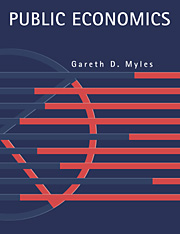Book contents
9 - Public goods
Published online by Cambridge University Press: 05 June 2012
Summary
INTRODUCTION
When a public good is provided, it can be consumed collectively by all households. Such collective consumption violates the assumption of the private nature of the goods in the Arrow–Debreu competitive economy. The existence of public goods then leads to a failure of the competitive equilibrium to be efficient. This implies a potential role for the state in public good provision to overcome the failure of the market.
The formal analysis of public goods began with Samuelson (1954) who derived the rule characterising efficient levels of provision and, after defining some necessary terms, this will also be the starting point of this chapter. Efficient provision will be considered for pure public goods and for public goods subject to congestion. The theme of efficiency is continued into the study of Lindahl equilibria with personalised prices. Following this, the analysis of private provision demonstrates the nature of the outcome when prices are uniform and illustrates why a competitive market fails to attain efficiency.
If government provision is to be justified, it must be shown that the government can improve upon the market outcome. Section 6 shows what can be achieved when policy instruments are restricted to commodity taxation and uniform lump-sum taxes. In seeking the attainment of an efficient outcome, the government is faced with informational constraints of which the lack of knowledge of household preferences is the most significant. Section 7 on mechanism design shows why households may choose to misrepresent their preferences and how mechanisms can be designed to overcome this.
- Type
- Chapter
- Information
- Public Economics , pp. 263 - 311Publisher: Cambridge University PressPrint publication year: 1995



